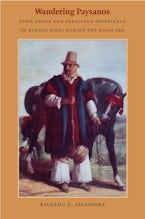“In the best tradition of subaltern studies, Ricardo Salvatore goes to the military records, court cases, and police files that most reveal the testimony of the popular classes. His book represents the most complete and nuanced analysis of the lives of peons, migrants, itinerants, and common soldiers-including their dress, family relationships, interaction with the Rosista state, and demands for liberty in the job market. Wandering Paysanos is both theoretically sophisticated and richly documented.”-Jonathan C. Brown, University of Texas
"Meticulously researched in official correspondence, military records, judicial archives, political poetry, and other popular narratives, Wandering Paysanos contributes importantly to interdisciplinary discussions of modern state formation and rural political and social consciousness. Few students of the Latin American past can match Salvatore in combining skillful analysis of political, social, and economic relations with an ability to deconstruct and interpret texts. This volume redeems the promise of Latin American subaltern studies."-Gilbert M. Joseph, Yale University
"Wandering Paysanos is an outstanding contribution to both the history of the first half of the nineteenth-century in Argentina and the recuperation of subaltern voices in Latin American studies."
- José Antonio Sánchez Román (Hispanic American Historical Review) "Impressive. . . . Salvatore's analysis is rich and nuanced."
- Ruth Stanley (Crime, History and Societies) "Masterful. . . . The book contains much of interest to scholars, graduate students, and advanced undergraduates specializing in peasant studies, comparative development in Latin America, Latin American history, and penal and military history. . . . Vivid and absorbing. . . . This is social history at its best."
- Lisa Kowalchuk (American Journal of Sociology) "This book represents an enormous contribution . . . to the political and social history of rural populations of nineteenth-century Latin America."
- Jose C. Moya (The Americas)

